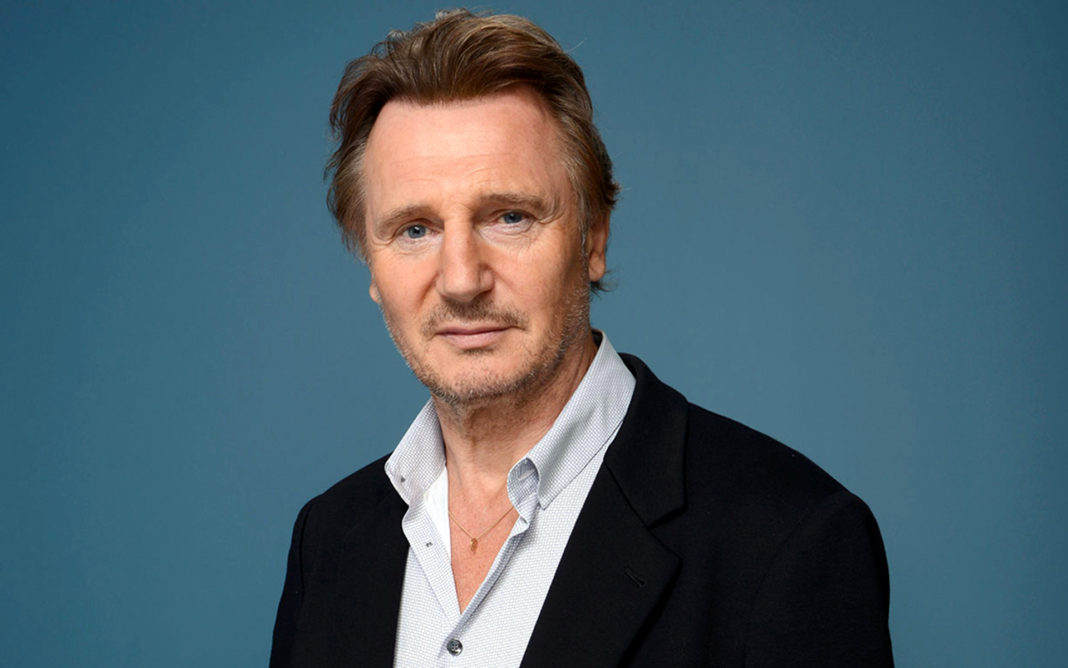I know, I know. Liam Neeson is a 65-year-old rich, white, male movie star. I shouldn’t be disappointed that he seems completely out of touch on the #MeToo movement, but God Almighty, Liam.
I had the Late Late Show on last Friday night with the sound off. I was waiting for former White House Press Secretary Sean Spicer’s appearance, and I was busy transcribing the words of a wonderful woman, Sheila O’Byrne, who was 19 years of age when she was sent to St Patrick’s on Dublin’s Navan Road in 1976 for the crime of being pregnant. From what Sheila told me, she was an innocent young girl. “I wasn’t into that sort of thing … Nobody told us about the birds and the bees!”
Sheila hasn’t seen her son since he was a little baby, taken from her arms and sold by the nuns. He’d be 41 now, wherever he is. I spent a couple of hours in Sheila’s lovely house off Blarney Street the other night.
Sheila is desperate to know where her little boy is. She never married, never had any other kids.
“Not after what was done to me,” she told me, over a cup of coffee and biscuits on a foggy night in Cork city. Sheila lives not far from the site of the former Good Shepherd Magdalene Laundry in Sunday’s Well, and she is disgusted at the thought that a place of such horror might be concreted over and have an apartment block built on it.
I’ll tell you Sheila’s story in better detail another time, if that’s okay, because as I was transcribing her harrowing words, onto my TV screen strode the rangy, lean and rugged Liam Neeson. Looking much younger than his 65 years, there was Oskar Schindler, Michael Collins and whatever his name was when he promised he would track you down and kill you.
I turned up the sound. Who isn’t a Liam Neeson fan?
He had a nice chat with Ryan Tubridy, talking about his early days in Ballymena, his family, and his wildly successful career as an actor. Everything was going grand until Tubridy asked him what he makes of the Me Too movement in Hollywood – a movement which has seen many powerful men exposed as sexual abusers – and asked if Neeson is “happy to see things moving the way they’re moving”.
Neeson’s granite features seemed to shift, and he replied “Yes,” before immediately adding “There is a bit of a witch hunt happening too.”
He went on: “There’s some people, famous people suddenly accused of touching some girl’s knee, or something, and suddenly they’re being dropped from their programme, or something.”
Neeson then launched into the recent case of the broadcaster and writer Garrison Keillor, fired by Minnesota Public Radio (MPR) late last year over allegations of ‘inappropriate behavior with an individual who worked with him’.
Neither MPR nor Keillor’s accuser have publicly disclosed the details of the allegations that led to his dismissal, but Keillor told a local newspaper: “I put my hand on a woman’s bare back. I meant to pat her back after she told me about her unhappiness and her shirt was open and my hand went up it about six inches. She recoiled. I apologised. I sent her an email of apology later and she replied that she had forgiven me … We continued to be friendly right up until her lawyer called.”
Neeson appeared to give Keillor’s version of events as a justification for saying Me Too is ‘a witch hunt’, and for seeming to boil down serious allegations of sexual predation to ‘touching some girl’s knee, or something’.
“And yet,” ventured Tubridy, “There’s the other side of things …”
To that, Neeson seemed to agree, at least to an extent. “There’s the other … There’s the Harvey Weinstein stuff which is … .” He trailed off, shaking his head. When Tubridy mentioned Kevin Spacey, Neeson replied “Kevin too.”
When Tubridy mentioned Dustin Hoffman, Neeson said he was ‘on the fence’ about allegations against Hoffman, saying that what Hoffman had been accused of was ‘childhood stuff’.
Perhaps Neeson is not aware of the details of the allegations against Hoffman. Hoffman has been accused of sexual assault by multiple women, of exposing himself to a minor and of sexual harassment. Some of those accusations date to the 1980s, when Hoffman was pushing on for 50. Hardly ‘childhood stuff’.
Neeson said “When you’re doing a play and you’re with your ‘family’, other actors, technicians, you do silly things, you do silly things, and it becomes kind of superstitious if you don’t do it every night, you think it’s going to jinx the show. Apparently he touched some girls’ breasts, but it’s childhood stuff.”
As Carl Kinsella, writing for JOE.ie, put it, “It’s an excuse that’s actually hard to dignify with a response. Is Neeson saying that men were groping women out of … superstition? Even thinking about this explanation for like five seconds is enough to make your brain shut down.”
Neeson conceded – eventually – that Me Too is now a global movement, talking about the horrific conditions endured by female workers in the Third World, but his point seemed unclear, given his seeming reluctance to accept the word of some of his own female colleagues.
It was a perfect, and shocking, display of exactly why survivors of sexual assault find it so difficult to come forward. Survivors struggle with the fear that they won’t be believed, that their abusers will destroy them if they speak out, and that the powerful will always side with the powerful.
It’s terribly disappointing to see an Irish male movie star in his 60s go on the Late Late and talk about sexual abuse, and make it clear that he just doesn’t seem to get it. Just as well we have Brendan Gleeson (62). Gleeson was on the Late Late two months ago and was asked about Harvey Weinstein.
“It’s not just the Harvey Weinstein’s or anyone else,” replied Gleeson. “It’s part of a currency where people use sexual power plays and also this idea of ‘I can absolutely take your career away from you’ which is not so much that your aspirations won’t happen, but more so where do you go from there?
“It’s not just Harvey Weinstein. It’s all over the place where people are in powerful positions. It’s the abuse of power is what it’s about … and once you put the sexual stuff on top of that, it’s a horror show.”
I’ll leave you with a quote from Sheila O’Byrne. The only time Sheila was allowed to hold her baby in her arms was for his christening, for which she had to pay, even though she was slaving from dawn till dusk for the nuns.
“My Daddy gave me the money to pay for the christening. And then do you know what Mr Priest says?
“He said to me, ‘Well, Sheila, if you haven’t got the money, there’s other ways we can sort this out.’ And he reached over and he touched my left breast.
“I said ‘You’re alright, Father, I have my money’. I said ‘I’m paying in full.’
“And the nurse came straight in and took my baby off me.”
Childhood stuff, indeed.








